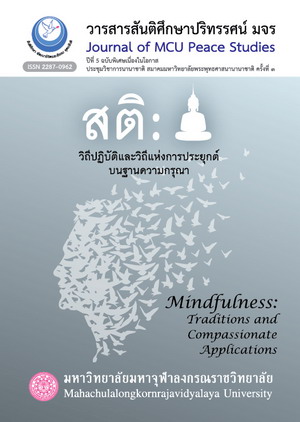Rice Culture : Inheritance of Local Wisdom in Beliefs and Ritesof Southern Isan Communities
Main Article Content
บทคัดย่อ
This thesis has 3 purposes which are; to study the history of rice culture beliefs
and rites of Southern Isan communities, to study the current condition and the problems
of rice traditional beliefs and rites of Southern Isan communities, and to study the local
wisdom in beliefs and rites of Southern Isan communities by qualitative research method.
The sample group of 90 people/monks was chosen by a purposive sampling and consisting
of knowledgeable persons, operators and general information providers. The tools used for
data collecting were survey form, participative observation form, in-depth interview form,
group conversation record and workshop record. The data was analyzed and present by
the descriptive analysis method.
The results are the following:
1. For the history of rice culture beliefs and rites of Southern Isan communities,
the communities believe that before rice planting, worship for Tarhag ghost must be
performed. After the harvesting, the rice is kept in the barn and the door of the barn must
be closed tightly. On the 3rd day of the waxing moon of the 3rd month, the rites for
opening the barn can be performed with Soo Kwan Khao and Harp Foon Sai Na and some
of the rice in the barn is taken to the temple. There is also a Boon Koon Larn traditional
rite which is a belief inherited from the ancestors.
2. For the current situation and problems in the rice culture beliefs and rites of
Southern Isan communities, it was found that there is still an inherited belief and rite of
Boon Koon Larn rite and barn opening. It is believed that there must be a Soo Kwan Kao
rite to worship Posop Goddess and the rice must be offered to the monks first before
consuming or distribution. Boon Kaya Sart virtue rite or San Done Ta rite of Cambodian
people is performed on the days of the waning moon in the 10th month. It is believed that
the ghosts of deceased ancestors will arrive to receive virtue from their descendants. If
they do not see their descendants performing virtue and donation on their behalf, they
will be sad and angry and curse them with a hardship in making a living.
3. For the inheritance of local wisdom in rice culture beliefs and rites of Southern
Isan communities, there are participation by the households, temples and schools as
follows:
Household: Having community meeting to specify the date, time and place of
each rite and inviting people from every household to participate in every rite being held
in the communities.
Temple: Providing facility, sound equipment and accessories required for the rites
and the monks provide Buddhism preaching relating to the virtue of rice. The participants
receive blessing from the monks and also holy water and amulets.
School: The schools will be the academic center of the communities and provide
ideas for the inheritance of beliefs and rites for each traditional virtue. They can have
activities to cultivate the awareness of the students to understand the procedure of each
rite with the emphasis on participation and direct and indirect involvement such as
drawing, reading, playing and direct involvement by attending the rite that is being held in
the communities and present their reports to the teachers for assessment.
Article Details
ทัศนะและความคิดเห็นที่ปรากฏในบทความในวารสาร ถือเป็นความรับผิดชอบของผู้เขียนบทความนั้น และไม่ถือเป็นทัศนะและความรับผิดชอบของกองบรรณาธิการ ยินยอมว่าบทความเป็นลิขสิทธิ์ของวารสาร


